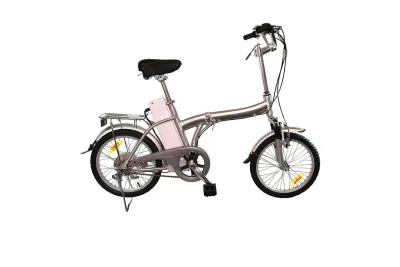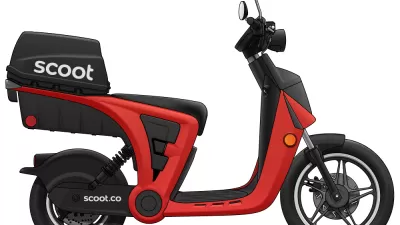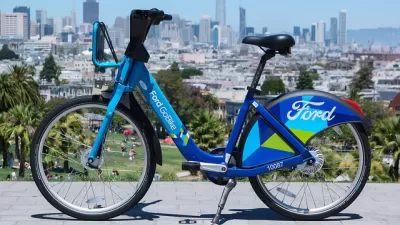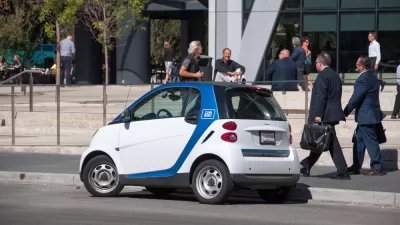Electric Bike Share! The new program is set to launch in famously hilly San Francisco and across the bay in Berkeley next spring. Unlike the region's bike share which just launched August 29, it will be administered by the non-profit City Car Share.

For new cyclists who may have found themselves incapable of climbing San Francisco's steep hills with Bay Area Bike Share (BABS) bikes, help is on the way in the form of an environmentally-friendly alternative, also with two wheels: the electric power-assist bike.
Lydia Tuan writes about a unique program that "partners City CarShare, a Bay Area nonprofit car-sharing service, with the Transportation Sustainability Research Center at the UC Berkeley Institute of Transportation Studies. The program will provide 90 bikes, and 22 of the 90 will be electric cargo bicycles, at up to 25 locations, eight of which are in Berkeley", she writes.
According to Susan Shaheen, co-director of the research center and leader of the electric-bicycle project, the project may be the first to be tested in the United States.
For the record, Berkeley has steep hills as well - they are just not as well-known.
“The idea is that (the electric bicycle) becomes a resource, very much like a Zipcar,” said Daniel Kammen, co-director of the Transportation Sustainability Research Center. “You can go shopping and do various things up and down Berkeley’s hills. You’ll need the electric feature to get back and forth.”
To rent an electric-assist bike, you will first have to join City CarShare. Unlike BABS, where you can pick up the bike in one location and drop it off at another, e.g. from the SF Caltrain Station and then bike one to two miles away to the financial district, you'll have to return the electric bike to its original location.
According to Anita Daley, marketing director of City CarShare, the cost of sharing an electric bike is 40 to 60 percent less than the cost of sharing a car, and bikers will not be charged a mileage fee.
Jessica Kwong of the San Francisco Examiner writes that the pilot program will "cost about $2 million over three years". Funding will come from the San Francisco Municipal Transportation Agency that includes "a $740,000 grant from the Federal Highway Administration". Tuan writes that on August 20, the "SFMTA board of directors voted to grant $1.5 million for the program."
The role of the federal government was critical to launching the program, wrote Jose Garthwaite in The New York Times Green Blog last year.
The Federal Highway Administration’s Value Pricing Pilot Program [a relic of the 2005 SAFETEA-LU] awarded $1.5 million for the initiative through the San Francisco Metropolitan Transportation Agency, the project’s fiscal sponsor. Ultimately the money will go to the local nonprofit City CarShare, which plans to integrate the e-bikes and trailers with its existing car sharing service, and to the Transportation Sustainability Research Center at University of California, Berkeley, which is responsible for assessing the impact and lessons learned from the project.
FULL STORY: Electric-bicycle-sharing pilot program to launch in Berkeley, San Francisco in 2014

Planetizen Federal Action Tracker
A weekly monitor of how Trump’s orders and actions are impacting planners and planning in America.

Maui's Vacation Rental Debate Turns Ugly
Verbal attacks, misinformation campaigns and fistfights plague a high-stakes debate to convert thousands of vacation rentals into long-term housing.

San Francisco Suspends Traffic Calming Amidst Record Deaths
Citing “a challenging fiscal landscape,” the city will cease the program on the heels of 42 traffic deaths, including 24 pedestrians.

Amtrak Rolls Out New Orleans to Alabama “Mardi Gras” Train
The new service will operate morning and evening departures between Mobile and New Orleans.

The Subversive Car-Free Guide to Trump's Great American Road Trip
Car-free ways to access Chicagoland’s best tourist attractions.

San Antonio and Austin are Fusing Into one Massive Megaregion
The region spanning the two central Texas cities is growing fast, posing challenges for local infrastructure and water supplies.
Urban Design for Planners 1: Software Tools
This six-course series explores essential urban design concepts using open source software and equips planners with the tools they need to participate fully in the urban design process.
Planning for Universal Design
Learn the tools for implementing Universal Design in planning regulations.
Heyer Gruel & Associates PA
JM Goldson LLC
Custer County Colorado
City of Camden Redevelopment Agency
City of Astoria
Transportation Research & Education Center (TREC) at Portland State University
Jefferson Parish Government
Camden Redevelopment Agency
City of Claremont





























